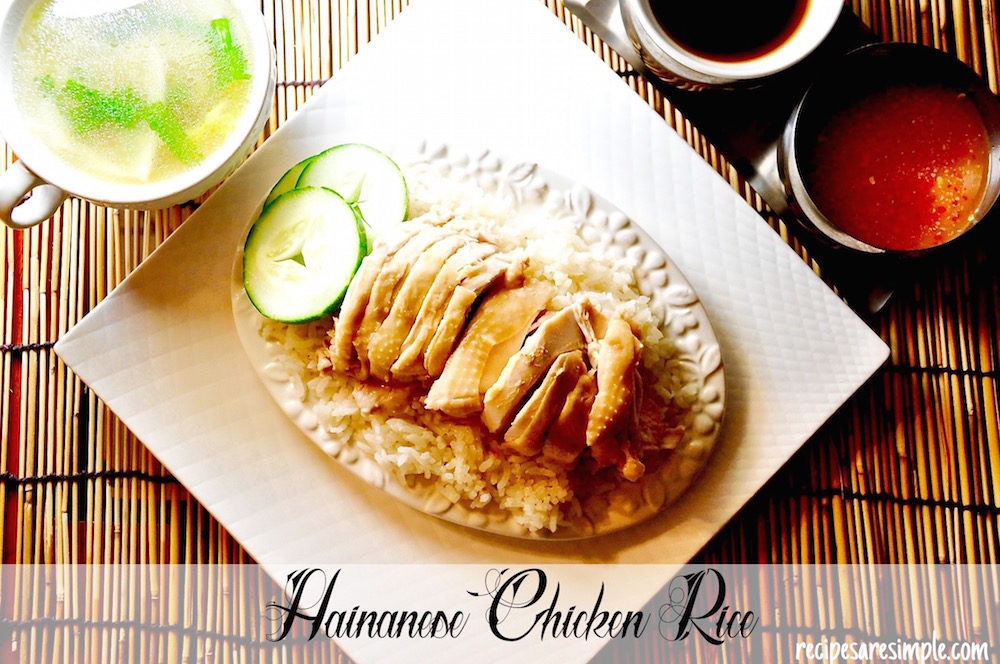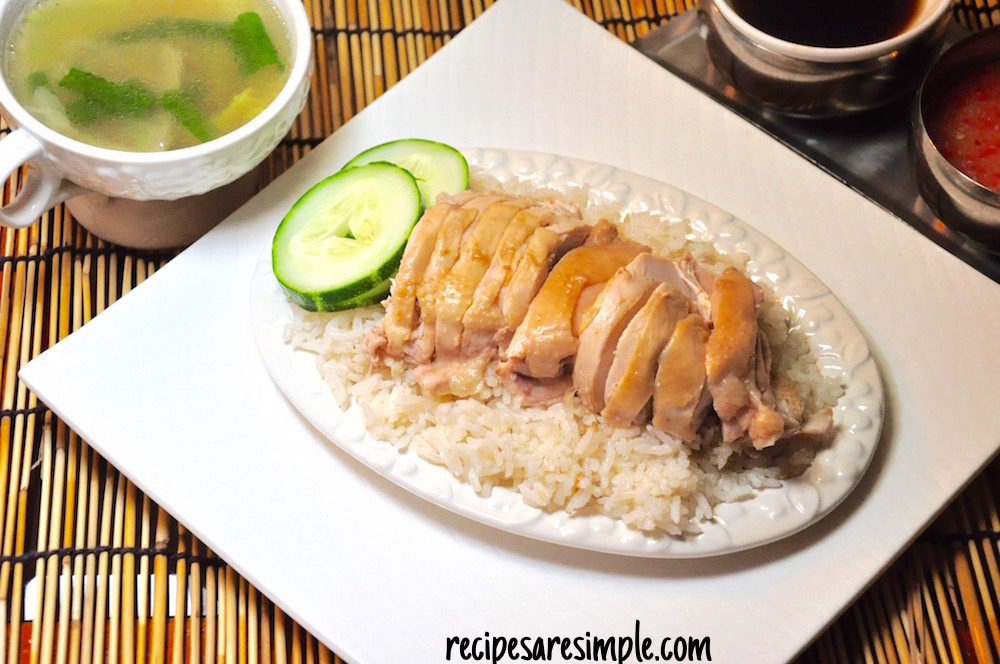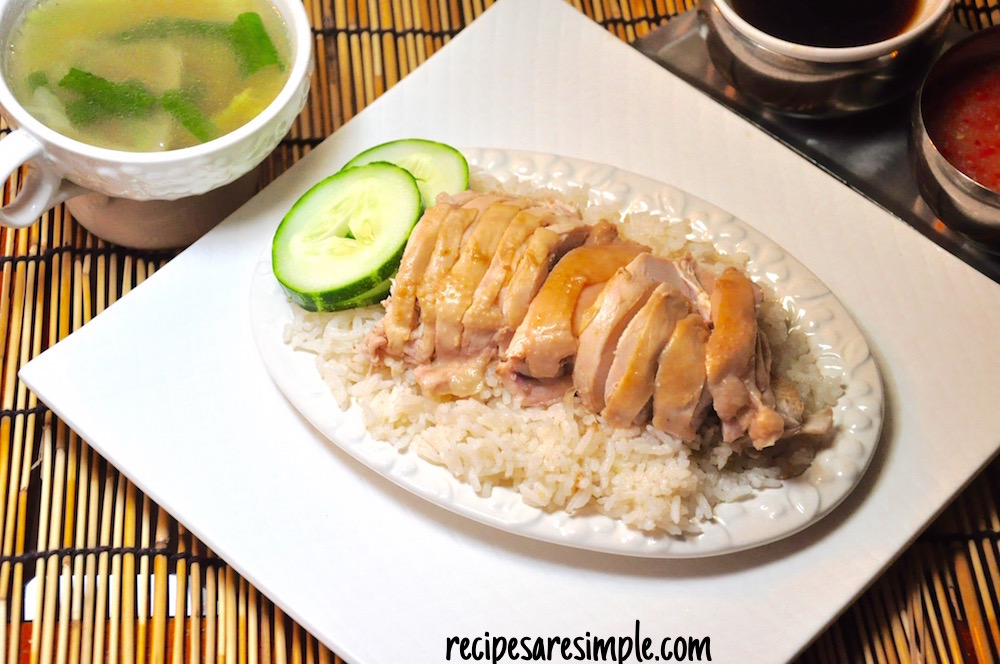Traditional Chinese Dish which is one of the National dishes of Singapore.
Poaching is a gentle method of cooking in a liquid and is better than boiling (for proteins) so that they are less likely to overcook and toughen.
The chicken that comes with Chicken rice, is found, steamed/poached, roasted, or even crumb-coated and fried.
Here, we take a look at the original white-poached chicken method. This chicken is best described as silky smooth and oh-so tender. This recipe guarantees the best results for this classic style of chicken rice.
Hainanese Chicken Rice | Hǎinán jī fàn

More about this dish is on the Intro page. Check it out.

|
♦Let me know if you tried – Hainanese Chicken Rice | Hǎinán jī fàn.. Please comment below. ♦You can also – Mail me your pics and testimonials 🙂 – recipesaresimple@gmail.com ♦on SOCIAL MEDIA tag me @recipesaresimple and hashtag it #recipesaresimple on any platform. Thank you so much! ♥ |
♦Quick Browse to see All Recipes by Category. ♦World Cuisines to browse recipes by Regional Cuisine.
♥Thanks for visiting www.recipesaresimple.com

Hainanese Chicken Rice | Hǎinán jī fàn
Description
In Singapore, Hainanese chicken rice is served everywhere from school canteens, hawker stalls to high-end restaurants. it is also one of the few local dishes served onboard Singapore Airlines. It is vastly considered to be the ultimate comfort food.
Ingredients:
For the Rice:
For the Soup:
For Chilli-Ginger Sauce
For Serving:
Instructions:
-
Clean the chicken cavity thoroughly. Rub inside and outside generously with some salt and then rinse thoroughly and drain. Set aside.
-
Mix together, Shao Xing/ Rice wine (Or Rice vinegar) with 2 tsp light soya sauce.
-
Rub inside the cavity of the chicken. Stuff the bird with the ginger, garlic, and spring onion.
-
You will need a pot just large enough to contain the chicken. Add sufficient water to cover the chicken by 2 inches, to the pot. Bring the water to a boil.
-
Now, lower the chicken into a pot of boiled water. Cover the pot and turn off the heat immediately.
-
Leave the chicken to stand in the hot water bath for 5 minutes.
-
Then, lift up the chicken gently and drain the cavity of liquids, keeping the stuffing inside.
-
Lower the chicken back into the water but do not reheat.
-
This time, leave the chicken in the hot water for 25 minutes.
-
Lift the chicken again, drain the cavity as before, and return. Turn the heat back on and bring back almost to boiling point. Turn off the heat and rest for a final 30 minutes.
-
By this time the chicken will be tenderly cooked. Leave the chicken in this stock, till time to serve. TIP: The safe internal temperature for cooked chicken is 165° Fahrenheit /75° Celsius. Use a meat/instant-read thermometer, inserted into the thickest part of the thigh but don't touch the bone. Or you can just cut through where the leg joins the thigh to ensure that your chicken is cooked well. In our poaching method, the chicken is cooked absolutely tender - however, cooking time may need to be increased for country fowl.
Prepare the Chilli-Ginger Sauce:
-
Add all ingredients for the sauce into a blender and blitz to a sauce. Slightly grainy.
-
Add a little light soy sauce to season or add salt.
Cook the Rice:
-
Heat the oil in a rice cooker (best) or a pot with a lid.
-
Add the ginger, garlic and spring onion. Sauté.
-
Add the chicken fat (if using) and fry till the fat is rendered. Remove any solid remnants.
-
Add the stock from the cooked chicken and bring to a simmer.
-
Also, add salt to taste (about 2 tsp).
-
Tip in the rice, cover, and cook till the rice cooker indicator turns off. (If using a pot with a lid, lower heat and simmer, partially covered until water is entirely absorbed). (About 10 minutes).
-
Once done, immediately fluff up the rice with a fork.
For the Soup:
-
Use any stock from the simmered chicken, which is leftover after making the chilli -ginger sauce and cooking the rice - to make a light soup.
-
Bring back to boil and skim off any scum that floats on the surface.
-
Add chopped cabbage, salt, and pepper to taste. Boil for 1 minute.
-
Add spring onion greens last and remove from heat.
Time to serve:
-
Combine 2 1/2 Tbsp light soy sauce with the sesame oil and salt to taste.
-
Drain the chicken from the stock. You will see how silky textured the skin is at this point.
-
Rub the sesame-soy mixture all over the outside of the chicken using your hands.
-
Now, chop the chicken right through the bones into bite-size strips with a Chinese cleaver.
-
(You can discard the bone section on the underside of the breast meat.)
-
Serve the chicken with the rice. Serve along with more sesame and light soy mixture, dark soy with freshly grated ginger, chili-ginger sauce, soup, and cucumber slices.
Note
- Key Ingredients: Chicken, Rice, Ginger, Garlic, Spring Onion, Oil, Soy, Sesame Oil, Salt



This is an amazing dish. I have made it several times and I am doing it again today. Very easy and worth any effort you put into it. I can highly recommend this chicken.
Thank you Jan… So happy to hear you like it. Nothing like the simple and elegant traditional poached chicken.. it’s so tender.
Tried it and love your technique, though it came out with a little blood so i had to send it back to the pan and boil it so i could serve it.
For next time i think I will add another poaching stage to make sure no reds remain.
Could be the difference of your stove burner.. Yes please adjust the time accordingly. Thanks so much!